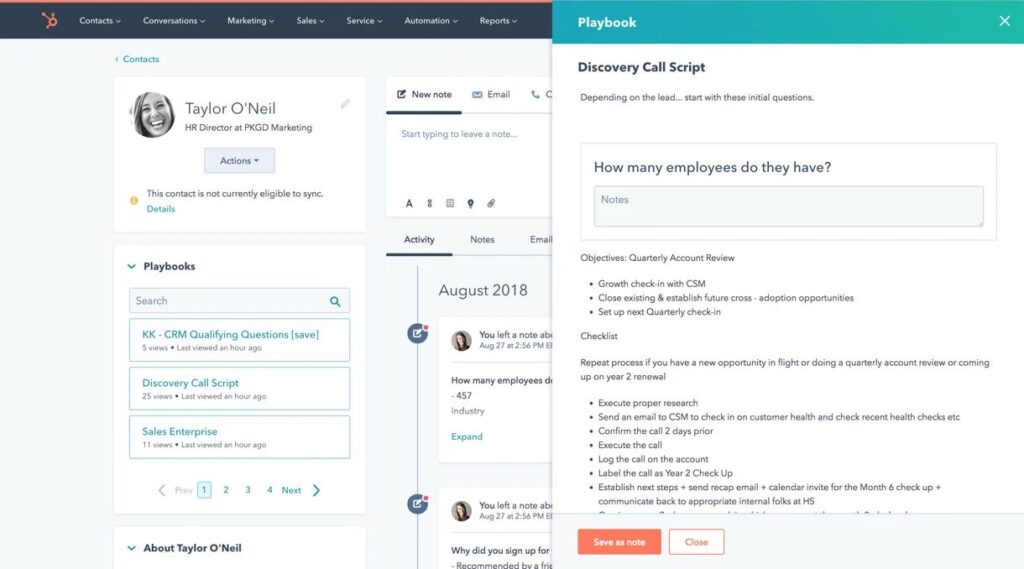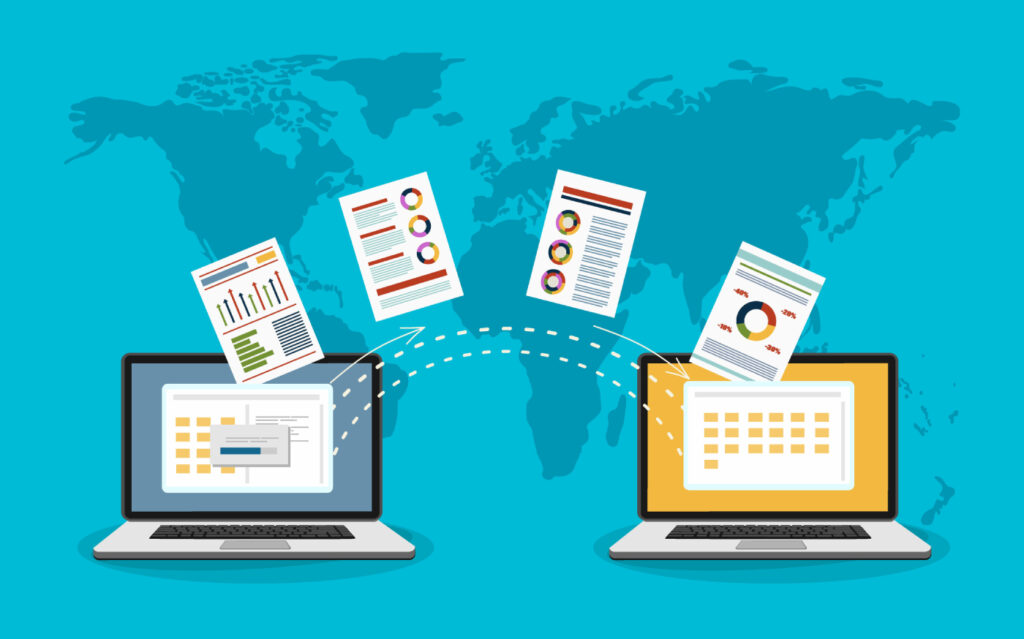Zoho is a great choice for those who need an entry-level CRM solution. It provides all the fundamental functions required from a full-scale CRM, including automated workflows, campaigns, processes, and customer experiences.
- HubSpot: Best for team adoption
- Insightly: Best for sales
- Pipedrive: Best for small- and medium-sized businesses
- Freshsales: Best AI-driven CRM
- Microsoft Dynamics 365: Best overall
Top reasons to look for Zoho alternatives
Although Zoho is a full-scale CRM that provides plenty of features and functionality, there are a few reasons why an organization might consider switching to one of their competitors.
Based on our research, Zoho is:
- Limited in marketing automation.
- It’s primarily a SaaS (software-as-a-service) platform, so many applications are only accessible online.
- While it does rely on some open-source technology, Zoho itself is closed-source. As a result, it lacks the customizability and flexibility of some of its competitors.
In some cases, organizations simply outgrow Zoho’s capabilities. Their lowest-priced tier, Standard, is slightly more expensive than some alternatives. For large organizations with dozens or hundreds of employees, their entry-level plan can be expensive. Considering this tier’s limited functionality, the monthly bill might not be worth it.
Regardless of the reason, there are plenty of Zoho alternatives to consider. While this isn’t an exhaustive list of alternative options, it serves as a great starting point for organizations looking for a CRM that better matches their needs.
HubSpot: Best for team adoption

HubSpot takes a holistic approach to sales, advertising a “crafted, not cobbled” solution that facilitates a seamless pipeline from lead generation to post-sale follow-up. By creating a seamless workflow, HubSpot delivers an experience that reduces silos between teams and increases adoption.
Users should adopt the former for several reasons when deciding between HubSpot and Zoho.
HubSpot is known for its easy-to-use interface, which makes it straightforward to adopt and navigate. The platform also has comprehensive inbound marketing capabilities, enabling businesses to attract and engage customers more effectively through content marketing, social media, and email marketing campaigns.
In addition, HubSpot’s ecosystem makes integration with other in-house tools efficient and simple — a considerable advantage for teams with lower CRM adoption rates due to learning curve bottlenecks.
READ MORE: HubSpot vs Zoho CRM
HubSpot key features
- Suite: Sales, marketing, service, operations, and CMS hubs
- Extensive lead generation tools: Forms, landing pages, live chat, and chatbots
- Social media management: Schedule, publish, and monitor social media posts and engage with audiences directly from the CRM
Why we chose HubSpot as a Zoho alternative:
- More intuitive/better user experience
- Comprehensive inbound marketing capabilities
- Unified platform
- Highly rated customer support with plenty of tutorials, guides, and documentation
HubSpot pricing
- Free CRM suite: $0/up to 2 users
- Starter: $15/per seat/month
- Professional: $90/per seat/month (plus a one-time $1,500 onboarding fee)
- Enterprise: $150/per seat/month (plus a one-time $1,500 onboarding fee)
Insightly: Best for sales

A popular name among Zoho alternatives is Insightly.
Founded in 2012, Insightly has grown to serve hundreds of thousands of users worldwide. It is tightly integrated with Google Apps/Office 365 and offers two versions tailored for sales or projects.
The platform is highly customizable to meet your needs. Insightly provides customizable fields, objects, page layouts, and more, although some features are locked behind the higher-priced tiers. Custom page layouts are available for every unique role in your company, and most teams will be able to customize these elements without the assistance of a developer, integration team, or customer support.
While you can customize your Insightly dashboard, the CRM includes several usable as-is dashboards. These put all of your organization’s pertinent data in one place and make it easy to share amongst the team as needed.
Insightly offers deeper functionality than Zoho in many respects, particularly for sales and marketing processes. At present, Insightly only integrates with two accounting platforms — Xero and Quickbooks — but that’s hardly a deal-breaker.
READ MORE: Insightly vs Zoho
Insightly key features
- Pipeline management: Track sales with customizable stages, offering better visibility into revenue forecasting
- Custom real-time data dashboards: Custom data visualizations are updated in real time
- Contact data organization: The contact management system integrates directly with social media and email
Why we chose Insightly as a Zoho alternative:
- Reporting tools quickly generate data visualizations assisted by business intelligence capabilities
- Large range of integrations with other platforms, including Microsoft Office 365, Gmail, G Suite, Xero, QuickBooks, Mailchimp, and Slack
- Deeper functionality for sales and marketing processes
Insightly pricing
- Free 14-day trial
- Plus: $29/user/month
- Professional: $49/user/month
- Enterprise: $99/user/month
Pipedrive: Best for small- and medium-sized businesses

Pipedrive caters to small- and medium-sized businesses in many ways. With five separate pricing plans to consider, each offering a 14-day free trial, organizational leaders are sure to find the plan that’s perfect for their team.
Their pricing tiers scale and build on the previous ones with even more functionality. While their Essential plan only supports 3,000 open deals, the Enterprise plan is unlimited. The Essential plan only supports 30 custom fields, but users can customize an unlimited number of fields with the Enterprise plan. Other features scale up according to the pricing tier, too.
Like many other Zoho CRM alternatives, Pipedrive lets users customize their plans with various add-ons. LeadBooster, for example, features an integrated chatbot, live chat functionality, web forms, scheduler, and a lead prospector to help generate more leads. Their Web Visitors add-on is ideal for those who want to better understand online customers’ habits and needs, and Pipedrive’s Campaigns add-on makes it easy to launch and monitor email campaigns.
READ MORE: Zoho CRM vs Pipedrive CRM
Pipedrive key features
- Customizable pipelines: Use Pipedrive to create your ideal platform, complete with different sales activities, processes, and stages
- Automation: Pipedrive makes it easy to automate routine tasks, processes, emails, reminders, and more
- AI-driven Sales Assistant: Predict upcoming deals, receive tips based on past performance, and access detailed analytics with Pipedrive’s AI Sales Assistant
Why we chose Pipedrive as a Zoho alternative:
- Much like Zoho, Pipedrive is a highly customizable platform
- Zoho’s AI features include Zia, which is great for day-to-day business needs, and their AI Sales Assistant
- Both Zoho and Pipedrive offer 14-day trials with all of their plans, allowing interested parties to try out their platforms before committing to a purchase
Pipedrive pricing
- Free 14-day trial
- Essential: $14/user/month
- Advanced: $39/user/month
- Professional: $49/user/month
- Power: $64/user/month
- Enterprise: $99/user/month
Freshsales: Best AI-driven CRM

A lightweight CRM that still boasts many of the same features seen in larger, more robust CRMs, Freshsales is one of the top Zoho competitors. While their Growth plan is a bit limited, with contact lifecycle stages, custom fields, and curated reporting, the platform’s functionality really shines in their higher-priced tiers.
Freshsales’ Pro plan introduces their proprietary AI platform, Freddy AI, which is capable of calculating contact scores and assigning customer fit ratings. Additional features in their Pro plan include advanced field customization, auto-assignment of rules, full-scale territory management, support for multiple sales pipelines, and advanced workflows.
Their highest-priced plan, the Enterprise plan, introduces sandbox mode, custom modules, field-level permissions, and even greater integration with Freddy AI, including detailed forecasting insights.
Users can customize their plans even further by purchasing AI agent session packs for an additional fee. These AI agents essentially serve as chatbots that engage customers across several different channels.
READ MORE: Freshsales vs Zoho
Freshsales key features
- Contact management: Centralize customer interactions across your entire organization and easily view sales or marketing contacts as needed
- Social media integration: One of the most popular Zoho social alternatives, Freshsales integrates with Facebook Messenger and LinkedIn
- Sales sequences: Available in the Pro and Enterprise plans, these sequences let your sales reps set up their own automated processes and track the results
Why we chose Freshsales as a Zoho alternative:
- Zoho and Freshsales offer mobile versions of their CRM platforms on iOS and Android
- Similarly to Zoho, Freshsales also offers a free CRM that supports up to three users
- Both platforms have a dedicated marketplace (Zoho Connect and Freshsales Classic Marketplace) that lets users integrate with third-party apps and services
Freshsales pricing
- 21-day free trial
- Free plan: $0/up to 3 users
- Growth: $9/user/month
- Pro: $39/user/month
- Enterprise: $59/user/month
Microsoft Dynamics 365 Sales: Best overall

Microsoft Dynamics 365 Sales is top amongst Zoho alternatives due to its seamless integration with the Microsoft ecosystem, advanced AI-driven insights, scalable modular applications, and powerful sales, marketing, customer service, and operations management tools.
The stability and reliability of the Microsoft name, the suite of pre-integrated tools that include accounting, ERP, email, and productivity functionality, and the wide array of products that bolt on to the platform make it a solid choice for any business.
For those interested in an all-Dynamics environment, consider Dynamics AX or GP for your accounting, as they integrate “out-of-the-box.” Those may be heavy-duty for smaller businesses, but lower-cost options such as QuickBooks and Xero require a third-party connector to integrate correctly.
Email is available through Microsoft, but Dynamics 365 Sales can integrate with nearly any mail client — making it one of the top Zoho mail alternatives available today.
READ MORE: Microsoft Dynamics CRM vs Salesforce
Microsoft Dynamics 365 Sales key features
- Connection to Linkedin Sales Navigator: Allows users to access Linkedin profiles of prospective clients directly from the CRM
- Integration with Microsoft ecosystem: Offers a familiar and unified experience for users
- Customization: High-level customization is available through the platform’s Power Apps, Power Automate, and Power Virtual Agent
Why we chose Dynamics 365 Sales as a Zoho alternative:
- Omnichannel customer support
- Modular applications including sales, marketing, customer service, field service, finance, supply management, and more
- Suite of user-friendly tools
Microsoft Dynamics 365 Sales pricing
- Free 30-day trial with Microsoft Dynamics 365 Sales Premium
- Professional: $65/user/month
- Enterprise: $105/user/month
- Premium: $150/user/month
- Variable: Contact Microsoft for a custom price quote
FAQs
1. What are the best Zoho alternatives for small businesses?
Pipedrive is a great choice for small- and medium-sized businesses alike. Additional Zoho CRM alternatives that are appropriate for small businesses include HubSpot, Insightly, and FreshSales, but it’s important to remember that there are many different platforms available that cater specifically to smaller organizations.
2. Are there free alternatives to Zoho CRM?
Yes! Free Zoho alternatives are widely available. Both Freshsales and HubSpot offer free plans, while platforms like EngageBay and BIGContacts offer their Zoho CRM alternatives free of charge.
However, it’s important to note that most free CRM platforms are incredibly limited regarding features, functionality, and total users. As such, they’re generally better for small teams and those who want to experience the core features of CRM software before committing to a long-term purchase.
3. What are the pros and cons of switching from Zoho to another CRM platform?
Common pros of switching include improved customizability and scalability, greater access to third-party integrations, and access to advanced or niche features not included in Zoho’s pricing plans.
Some cons include the limited availability of other free CRMs today, the potential downtime of switching to one of the current Zoho alternatives, and the time it takes for your team to become familiar with the new system once it’s all up and running.
4. What is better than Zoho?
Some Zoho CRM alternatives are better than Zoho for certain functions and applications. For example, HubSpot is better for large teams, and Insightly is a better platform for sales. The term is highly subjective, however, so it comes down to your intended usage and organizational goals.





